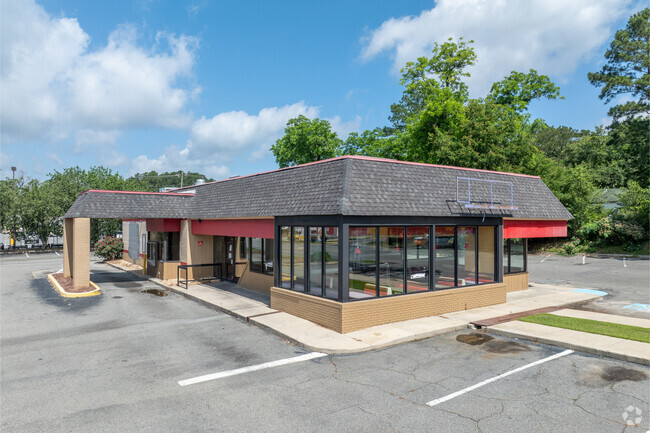Commercial Real Estate for Sale: Unlock New Organization Spaces
Commercial Residences up for sale: Secret Tips for Choosing the Right Investment
Investing in commercial buildings provides an one-of-a-kind collection of difficulties and opportunities that call for a strategic technique. Neighborhood market dynamics, property types, and monetary metrics are all essential elements that need to be carefully evaluated to guarantee an audio financial investment.
Understand Your Investment Goals
Prior to diving right into the industrial actual estate market, it's essential to clarify your investment objectives. Recognizing what you intend to attain will certainly guide your decisions and help you choose buildings that align with your monetary purposes. Take into consideration whether you are looking for temporary gains via residential or commercial property flipping or long-lasting income generation by means of rental earnings. Your method will dramatically affect the kind of business residential or commercial properties you pursue.
Additionally, review your danger resistance. Are you prepared to buy higher-risk homes that may offer significant returns, or do you choose extra steady investments with reduced yields? This analysis will shape your approach to building choice and funding choices.
An additional important aspect is establishing the preferred degree of involvement in building management. Some financiers choose a hands-on role, while others might choose easy revenue through building administration firms. Clarifying this will certainly direct you in choosing residential or commercial properties that fit your monitoring design.
Research the Local Market
Recognizing the neighborhood market is vital for making notified choices in business real estate investing. A comprehensive market evaluation gives insights into current trends, home worths, and development possibility within a specific area. Begin by assessing regional economic signs such as employment rates, population growth, and company development. These variables can considerably influence demand for commercial homes.
Next, investigate the affordable landscape. Recognize existing buildings comparable to your investment consideration and assess their tenancy rates, rental prices, and lessee accounts. This information will aid you assess market saturation and prospective success. Additionally, acquaint yourself with local zoning legislations, infrastructure advancements, and any type of upcoming tasks that may affect building values.
Networking with neighborhood realty specialists can also give valuable viewpoints on the market. Engaging with brokers, property managers, and capitalists permits you to collect first-hand knowledge regarding market characteristics and emerging chances.
Last but not least, think about demographic variables, such as age, earnings degrees, and consumer behavior, as these will certainly influence the kinds of services that grow in the area. By conducting detailed research, you can make tactical investment choices that straighten with market problems and your financial investment goals.
Analyze Residential Property Kind
What sorts of commercial residential properties straighten finest with your financial investment strategy? Understanding the various classifications of industrial property is important for making notified choices. The most typical residential property kinds consist of office buildings, retail areas, industrial homes, multifamily housing, and special-purpose residential properties such as hotels or medical facilities.
Office complex can vary from single-tenant frameworks to big multi-tenant skyscrapers, each offering one-of-a-kind monitoring and lessee characteristics. Retail areas, consisting of buying centers and standalone shops, require an understanding of consumer patterns and foot website traffic. commercial sales listings melbourne. Industrial properties, such as storehouses and producing facilities, offer possibilities in logistics and supply chain monitoring
Multifamily real estate, such as apartment or condo complicateds, can provide regular cash money flow through rental revenue and are commonly less affected by financial recessions. Special-purpose homes, while possibly greater danger, can yield substantial returns if appropriately managed and situated tactically.
When evaluating residential property types, take into consideration how they fit within your threat tolerance, financial investment goals, and market problems. Each type has its very own set of difficulties and opportunities, making it vital to align your option with a well-defined investment approach.
Evaluate Financial Metrics
Assessing financial metrics is a critical step in analyzing the practicality of business residential or commercial properties offer for sale. Secret indications such as the cap rate, cash-on-cash return, and web operating revenue (NOI) offer very useful insights right into a home's efficiency and potential success.
The capitalization price, determined by separating NOI find this by the home's acquisition rate, offers a snapshot of expected returns relative to the investment. A greater cap price commonly indicates a more beneficial investment, presuming various other aspects continue to be constant. Cash-on-cash return gauges the annual pre-tax money flow about the amount of cash money invested, permitting investors to evaluate exactly how rapidly they can anticipate see a return on their first investment.
Additionally, evaluating NOI, which shows overall income created from the property minus operating costs, is important for understanding the home's monetary health. It is advisable to compare these metrics versus sector criteria and similar buildings in the market to make sure competition.

Think About Future Growth Potential
Considering future growth potential is essential for capitalists looking for long-lasting success in industrial realty. Recognizing properties in locations with forecasted economic development can dramatically improve the value of a financial investment. Looking into regional market trends, demographic shifts, and infrastructure improvements is important to evaluate future demand for industrial homes.

An additional crucial element is analyzing the residential or commercial property type in relationship to market demand. Ecommerce growth might indicate a climbing demand for storehouse spaces, while urbanization fads could enhance demand for mixed-use growths.
Eventually, a thorough understanding of future development prospective makes it possible for financiers to make informed choices, placing them to profit from upward fads. By prioritizing locations with appealing projections, investors can maximize their returns and ensure an effective business real estate profile.
Conclusion
In verdict, choosing the proper industrial residential property for financial investment have a peek here requires a detailed method that includes specifying financial investment objectives, performing complete market research study, and comprehending different home kinds. A strategic and enlightened decision-making procedure is crucial for effective industrial home investment.